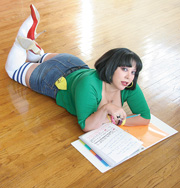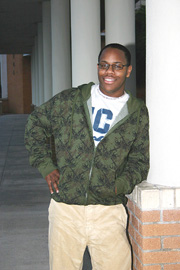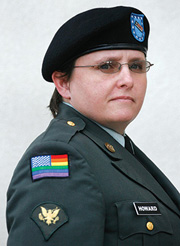
People to Watch
 By Joyce Gabiola, Marene Gustin, Natasha Avey, Tracy Morris, Rich Arenschieldt
By Joyce Gabiola, Marene Gustin, Natasha Avey, Tracy Morris, Rich Arenschieldt
MAKING SOME NOISE
The sultry Turkish-born singer/songwriter Evrim Baykal prepares to release her first EP and be heard better than ever. She leads our annual People To Watch list of intriguing, accomplished GLBT people who are making a difference
Confident, she rhythmically struts across the main room to the back courtyard of the Vintage Lounge, bidding hellos with her hips, wading through what seems like a pre-technicolor crowd against her powder blue eye shadow. Dressed with a vodka tonic, she stops to smoke a cigarette, and after peripherally watching the smoke rise from her full, pierced lips, I ponder, What makes Evrim Baykal, EVRiM (as she likes to present her name)? Native Houstonian, proud Turk, and surging solo artist, Baykal has difficulty answering this question, and it is yet another one unanswered.
If you were to ask her whether she prefers girls over boys, she won’t give you a definite answer, but a few things are certain. Baykal will seduce you with her mature, sensual voice; sing herself into your consciousness; and brush against your soul with her beaming smile and explosive cachinnation. Then she’ll tell you that her best physical feature is “[her] titties or [her] lips, leaning towards titties though.” She beams.

The 31-year-old MBA graduate (magna cum laude from the University of Miami) has been making noise this past year with the release of her single “Unanswered Questions,” a song based on her relationship with an unnamed woman (listen at her website, www.evrimsmusika.com). Baykal is pensive when asked about this woman, and while answering, she is shy and scattered, seemingly careful to say the “right” things. Although she and the woman shared only one quick kiss at Chances, the friendship that grew “was just really intense.” So intense, she concluded, “I must be a lesbian because I’ve never felt this way before about anyone, and I feel this way about a girl.”
“It was like Christmas!” Baykal exclaims, conveying through her joviality that her coming-out experience was like opening presents. In actuality, it was Christmas. After everyone had opened their gifts, she announced, “By the way everyone, I’m a lesbian.” The news didn’t come as a shock to her family, and Christmas that year continued as planned.
However, all-inclusive lesbianism was short-lived when Baykal realized she still had a thing for boys. She found herself “being in the closet about being kinda straight,” a phrase at which which she laughs heartily. The discrimination that exists against bisexuals in the GLBT community is something she grapples with. “Lesbians treat you different.”
Nothing is definite with Baykal. She is the culprit and the hero. She is trying to hold on and to let go. She likes lemons and limes. She playfully shares her motto: That’s a definite maybe…probably. Actually, there is one definite thing about her: change. She finds herself in a state of nervousness and claims she is happy because her life is changing so rapidly. Fittingly, evrim means “evolution” in Turkish. With a recently released single and an upcoming EP, Illness of Love,
set for release in February 2008, Baykal certainly has reasons for her incessant bursts of joy and laughter throughout our interview. Furthermore, she has written a book entitled Gazelle Therapy: The Rebel’s Handbook for the Journey of Life (set for 2009 publication), which she wrote during most of 2005 while living in Foca (Fo-cha), a fishing village in Turkey nestled in perfect view of the Aegean Sea and known as the site of the Siren rocks in Homer’s epic, The Odyssey .
Baykal wasn’t always celebrating her life on a daily basis. These days, she says, she finds herself
in a nurturing relationship with the universe, the entity that she believes is piecing her back together, back to herself, back to a feeling of home. The universe is healing her after years of falling apart, surviving physical abuse by a family member, two failed marriages, a period of time wrecked by alcohol and drug abuse, a few suicide attempts linked to an addiction to prescription drugs, and self-deprecating thoughts.
“I’ve lived a lot of life in a short time,” she says.
After her final numbing experience with the anti-depressant Clonazepam (better known by its brand name, Klonopin), which led to her most serious suicide attempt, Baykal was able to move toward her dreams of becoming a successful pop artist. She has evolved from an abused and lost girl to a strong, talented woman who knows and embraces herself.
Today she is a bright musical mastermind, brimming with confidence and boasting a clear conscience and grand sense of social responsibility. Like her musical compositions, Baykal is multi-faceted, complex, and sometimes sparkly. (She likes things that sparkle — “like girls.”) Her music is a direct reflection of her life and who she is. Although her voice has been compared to Shakira’s and Madonna’s, one absolutely cannot compare the entirety of her musical talents to anyone. The woman and the music are in a class of their own.
Baykal reveals she is wild, crazy, and open-minded. She forgets to mention informed, intelligent, charming, down-to-earth, and, of course, sexy. She is full of spirit and possesses a wickedly catching personality. She sang “Redneck Woman” at her wedding in Turkey, for goodness sake. She recalls, “It was wonderful!”
Baykal is one hot Turk to watch for years to come. But beware: She’s armed with spunk and loads of glitter and a brain that is eager to discuss the danger of excessive consumption of the fatty acid Omega-6, religious history, evolution, physics, and the personality of math. And she’s not afraid to hurl her thoughts at you. In fact, she divulges, “I’m an ear rapist.” Yikes.
By the way, girls and boys, she prefers…limes.
Joyce Gabiola, who recently returned to Houston after living in New York, profiled several pet owners and their pets for the November issue of OutSmart magazine.
______________________
Steven Haynes

For 19-year-old Steven Haynes, coming out at Ball High School in Galveston wasn’t a big deal. The only discrimination he ever faced occurred because he was black, not gay, so he never thought about gay bashing. Not until last December.
“I was with a gay friend, just walking down the hallway minding our own business,” Haynes remembers, “and this student started calling my friend names. And I thought, Wow, things aren’t as open as I thought.”
So what did this teen do? He went home that night and got on his computer and learned about the Gay-Straight Alliance Network, the San Francisco-based organization that helps create safe, friendly school environments for all students. That, he thought, was just what Ball High School needed.
“We got our paperwork finished this year,” Haynes says. “We already have 23 members, and it’s growing.” Although Haynes graduated in May, as founder of the Ball High GSA he has decided to remain active in guiding the organization and spearheading volunteer efforts. Among other activities, the group is working to present Risk , a play about HIV awareness, at the school this year. Haynes also works to raise awareness of the GSA, which included participation in the first Galveston Island Pride Festival in October. Next on his agenda: enrolling in the Art Institute of Dallas to study for a fashion-merchandising degree, then a career with his own shop.
“I’ll be like a personal shopper with a store that has a runway and everything!” he says. “I’ve already got it all planned out.”
While fashion may be his intended profession, volunteering will still be his passion. “For the rest of my life, until I die, I’ll always be an activist for the gay community.” —Marene Gustin • Photo by Giselle Monte
______________________
Barbara Howard

Don’t Ask, Don’t Tell” is what you would call a dirty phrase in the GLBT community. A policy some politicians hailed as progress when announced in 1993 has driven Barbara Howard to revive a much-needed stagnant local group.
Howard, who served in the Army in the 1980s before she was discharged for being a lesbian, is re-establishing the Houston chapter of American Veterans for Equal Rights (AVER). A group was active here several years ago but eventually faded away.
All too familiar with the discrimination within the military, Howard — who works as a real-estate paralegal — took it upon herself to restart a local group. The focus for the group, she says, is “to give GLBT veterans a forum to discuss their troubles as well as offer legal counsel and help to those who might need it.”
The revocation of the “Don’t Ask, Don’t Tell” policy, which would allow all citizens to serve openly in the military, is coming, Howard insists. “Homosexuals have fought and died for years to protect the rights of everyone, even when they do not possess the same rights as heterosexuals in this country,” she says. “It is time to put an end to this. All people want to do is serve.”
And serving is what they do, just quietly and in fear. At least 32,000 homosexuals now serve in the military, according to sources including the Service Members Legal Defense Network. The local AVER chapter currently has six members. Weekly meetings take place on the first Tuesday of the month at West Gray Café.
With a significant presidential election this year, a likely change in national leadership, and the need for more servicemen and women in wartime, “the time is now to make a difference,” Howard says. She and her AVER counterparts are at the ready. —Natasha Avey • Photo by Aaron Spracher
______________________











Comments